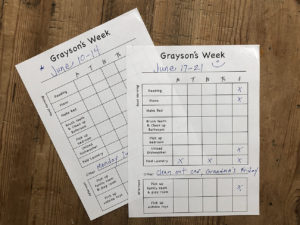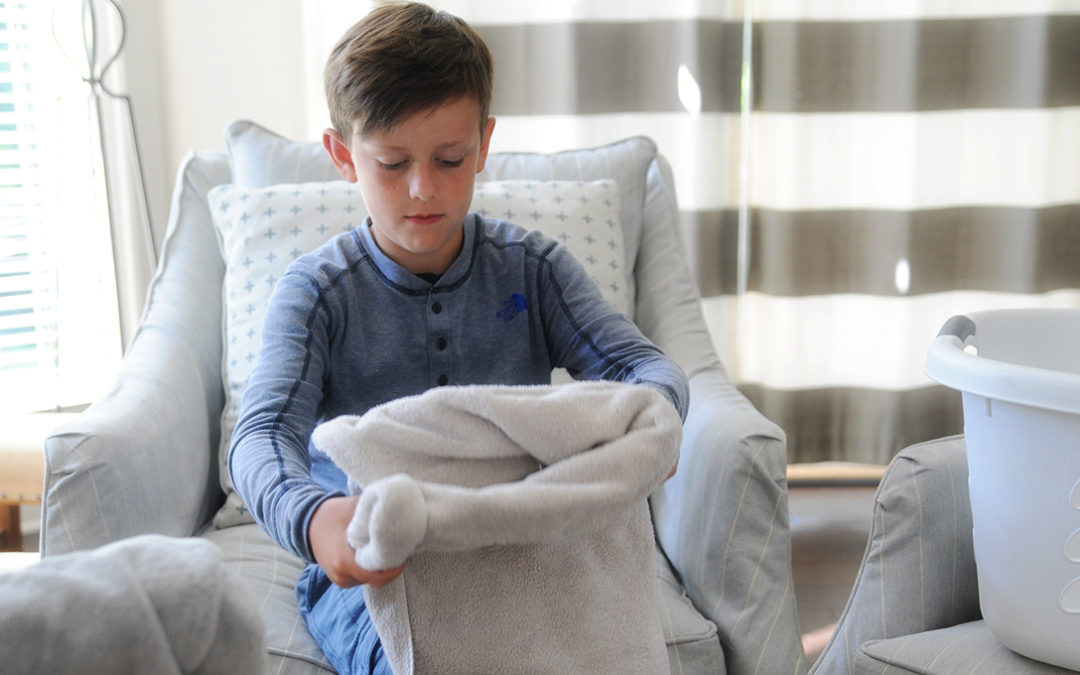Okay, raise of hands, how many of you have enthusiastically started a “chore list” with your kids only to have it fail 5 days in… (hand raised over here)! We have tried and failed, several times over the years to establish some sort of chore routine. We finally have something that works well for us, and I thought I would share it with you!
We have decided that instead of a “chore list,” we have a “daily routine.” We want to create a mentality in our kids that helping out is just what you do. We also feel that chores are an essential part of becoming a successful adult, so we put a lot of emphasis on the importance of routine. For all the reasons chores help develop healthy kiddos, read my post here!
So now down to the logistics:
We break our day into morning and afternoon tasks. The day always slips away, which is one thing that can sidetrack a chore routine. So the bulk of our to-do’s are done in the morning… at least during summer.
Each one of our kids has individual and group chores. For example, all three of my little people have “cleaning the playroom” on their daily list, and the goal is to use teamwork to get it done. However, making your bed, cleaning your room… that’s all on each kiddo. I want my people to be responsible for their own things as well as be a part of a working community.
And what I’ve learned is this… kids can do way more than they let on. So if you need someone to vacuum, put it on a list. If you want the toilets cleaned, put it on the list. Also, if your kid likes to dust, put it on their list. Give yourself a bonus for finding chores that kids really want to do. Here is a picture of my 8-year-old’s daily routine…

You can see there is a line titled “Other.” This is important for you because it adds flexibility. One week you might need them to vacuum on Wednesday because you have friends coming over or you decide to add a group task of cleaning the garage on Friday. Just make sure you write it down so it’s clear and they know what’s coming. I will also cross off things that I know we won’t get to that week. For example, if we are going to the zoo and I know laundry won’t get folded, I just cross it off… (and my kids cheer)!
My youngest, Ella, is only five. So instead of a sheet, she gets picture magnets placed on a board. Every day I put specific magnets on the board, and when she gets her job done, she takes off the magnet accordingly. Easy :). I just took photos of what I wanted her to do… pictures of her room cleaned, her toothbrush, etc. and then went to Pinhole Press to print the magnets. Or you can just take pictures and tape them up. Make this easy for you and for your littles!
Kids will not be perfect at this process. It’s natural to not want to unload the dishwasher. Let’s face it, we don’t start doing the happy dance either when the dryer beeper goes off and it’s time to fold towels. So, how do you keep kids motivated? Every kid has something they want, right? Maybe you use a reward system where they earn device time. Perhaps they get to stay up late… you need to pick a plan before you start a new routine.
In our house, we do two things…
1. No electronic device time if you don’t do your chores. The end. Chores always come first.
2. We have determined a daily amount of money they earn for doing their tasks. We went back and forth on giving them a monetary allowance. But, we want to teach our kids to save, spend, and tithe money wisely, and they actually have to have money to be able to do that. So, if they don’t do their chores, they don’t get their daily allowance. (And no device time.) If they have a terrible attitude… they also don’t get their money for that day. They don’t have to be excited to do their jobs, but if they cause you to have a horrible day because they are complaining and talking back… there is no reason to pay them.
There are some things that we as parents do that can cause failure in a chore plan too…
1. Being inconsistent as a parent.
If you decide your kids are going to start helping out around the house, STICK TO IT! If you are wishy-washy about setting a plan, they will be wishy-washy about following through with it.
2. Arguing with your kids about getting the jobs done.
Don’t enter in. Talk about the plan with your kids before you start. It doesn’t have to be a dictatorship – let them pick some of the things they want to do and add it to the list. When you finalize your list on paper, all parties know the plan.
3. Criticizing how well your children are doing the tasks.
They can’t slop their way through the jobs, of course, but watch out on being too critical. This is a time to encourage the heck out your kids. The more encouragement, the better they will do in the future. You may not like how the cups are stacked in the cabinet, but guess what, they are in there. You didn’t do it. Your kid feels like he helped out. Thank him for doing it.
4. Being unwilling to change up the routines.
Kids get older, and seasons and schedules change. So maybe in the summer, they have more to do, and in the winter you go back to basics. It’s okay to change things up. Every new month or season take a look at the list and change-up what needs to be added or even taken away.
Kids and chores… we can do this! Figure out a plan and find your groove. We started this system two years ago, and it continues to work for us. Sometimes, we have to remind them to do their tasks, but they know it’s just part of the day. Like any good habit, it’s going to take time. Stay the course, friends!














